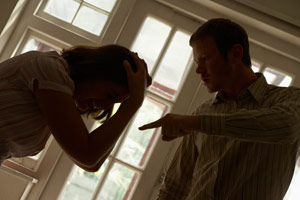
Violence prevention for men
- Get help for violence in your life
- Help prevent violence among youth
- More information on violence prevention for men
Consider these facts about victims of violence in the United States:
- Almost 90 percent of homicide victims among 18- to 24-year-olds are males.
- Homicide is the fourth leading cause of death for black males.
- Males are almost four times more likely than females to be murdered.
The statistics on violent deaths tell only part of the story, though. Many more men survive violence and are left with permanent physical and emotional scars. Violence can do terrible damage to a man’s work, his health, his family, and his whole community.
Get help for violence in your life
Are you a victim of relationship violence?
If you are the victim of violence in a relationship, you are not alone. The National Domestic Violence Hotline offers free, confidential help 24 hours a day. Call 800-799-SAFE (7233).
Violence against anyone, in any form, is a crime, no matter who committed the violent act. It is always wrong, whether the abuser is a family member, a current or past spouse, a friend, or a stranger.
Many people don't talk about the fact that men are sometimes victims of intimate partner violence (also known as domestic violence). Men may feel uncomfortable reporting it. But if you have been attacked, remember that you are not at fault, and you do not deserve to be hurt.
If you have been sexually, physically, or emotionally abused, seek help. You could turn to family members, friends, or religious or community organizations. Talk with a doctor, especially if you have been physically hurt. Talk with a counselor to help deal with your emotional pain. And if you know someone who is being hurt, work to get that person help.
Are you violent?
Maybe you abuse somebody you love. Perhaps you lash out physically at others when angry. If you want to stop the cycle of violence in your life, talk to your doctor. Your doctor can help you find a mental health professional, who can help you deal with your problem. You also can find mental health services near you by using the Mental Health Services Locator.
Help prevent violence among youth
Violence among men can start young. In 2009, for example, nearly 4 out of 10 high school boys had been in a fight during the past year — almost twice as many as girls. You can do your part to stop violence by being a good role model to the young men in your life. Many young men want advice on how to deal with conflict and behave in relationships, but may not know how to ask for your help. Whether you are a father, coach, teacher, uncle, older brother, or mentor, you can make a real difference in boys' lives. Teach them to reject violence and to choose respect. Share your own experiences and what you've learned.
Womenshealth.gov's section on violence against women will provide you with information on dating and sexual violence, stalking, and elder abuse, including specific resources on how to get help.
More information on violence prevention for men
Explore other publications and websites
-
Are You Being Abused? (Copyright © American College of Obstetricians and Gynecologists) — This simple quiz helps victims and those who care about them identify the signs of abuse. It encourages victims to seek assistance and gives phone numbers to call for help.
http://www.acog.org/departments/dept_notice.cfm?recno=17&bulletin=198
-
Coaching Boys Into Men Playbook (Copyright © Family Violence Prevention Fund) — This guidebook provides strategies for parents, teachers, coaches, and other role models to teach boys about violence against women in an effort to prevent it.
http://www.founding-fathers.org/content/files/become_cbim_coachesplaybook.pdf
-
Rape as a Men's Issue: Why Should Men Care About Rape? (Copyright © Men Can Stop Rape) — This publication discusses why sexual violence is a male issue.
http://www.mencanstoprape.org/usr_doc/MCSR_Handout_-_Rape_As_a_Men%27s_Issue.pdf
-
Resources for Male Survivors (Copyright © Men Can Stop Rape) — This fact sheet explains the incidence of sexual assault on men, and why it is an underreported issue. It explores common questions about perpetrators of male rape, sexuality, how to respond sensitively to male rape survivors, and where they can go for help.
http://www.mencanstoprape.org/info-url2699/info-url_list.htm?section=Resources%20for%20Male%20Survivors
-
When Men Are Victims (Copyright © Florida Council Against Sexual Violence) — Men and boys are often reluctant to report the crime of sexual assault or to seek services because they feel humiliated, shamed, or confused by the crime. Anyone who has been the victim of sexual assault needs compassion, sensitivity, and caring. This publication tells how a victim might feel and what you can do to prevent sexual assault.
http://www.fcasv.org/publications/when-men-are-victims
-
Youth Violence — Prevention Strategies — Youth violence is a serious problem that can have lasting harmful effects on victims and their family, friends, and communities. This website discusses ways to prevent youth violence.
http://www.cdc.gov/ViolencePrevention/youthviolence/prevention.html
Connect with other organizations
-
Domestic Abuse Helpline for Men and Women
http://dahmw.org/
-
Futures Without Violence
http://endabuse.org/
-
MaleSurvivor.org
http://www.malesurvivor.org/
-
Men Can Stop Rape
http://www.mencanstoprape.org/
-
Men Stopping Violence
http://www.menstoppingviolence.org/
-
National Center for Victims of Crime
http://www.ncvc.org/ncvc/main.aspx?dbID=dash_Home
-
National Criminal Justice Reference Service (NCJRS)
https://www.ncjrs.gov/
-
National Domestic Violence Hotline
http://www.thehotline.org/
-
National Online Resource Center on Violence Against Women
http://www.vawnet.org/
-
Rape, Abuse, and Incest National Network
http://www.rainn.org/
Content last updated January 10, 2011.
Resources last updated January 10, 2011.
womenshealth.gov
A federal government website managed by the Office on Women's Health in the Office of the Assistant Secretary for Health at the U.S. Department of Health and Human Services.
200 Independence Avenue, S.W. • Washington, DC 20201


 Text size
Text size Email
Email
